Getting your Trinity Audio player ready...
There’s a symbolic, even ironic, connection between the Palestinian Authority’s admission into Interpol and the decision made by Supreme Court Chief Justice Miriam Naor not to include a representative of the judicial authority in the ceremony marking 50 years of Jewish settlement in the West Bank :Since the Supreme Court decided in 1967 to give Palestinians living in the occupied territories access to the High Court of Justice, it has been saving Israel from international sanctions.
In other words, although the Supreme Court refused to send a representative to the ceremony, one of the reasons the settlement enterprise which was celebrated Wednesday evening still exists without international sanctions—at least in terms of international law—is thanks to that decision made by the Supreme Court.
In the 50 years that have passed since then, and especially since the establishment of the International Criminal Court (ICC) in The Hague in 2000, the High Court has singlehandedly prevented lawsuits against Israel. Ask Prime Minister Benjamin Netanyahu, who often boasts during his visits abroad that Israel’s Supreme Court is considered one of the most prestigious legal institutions in the world. And while that hasn’t stopped his ministers from turning the Supreme Court justices into the enemies of the people, their rulings have prevented Israel from becoming the enemy of the world.
1 View gallery


Supreme Court Chief Justice Miriam Naor not only defended judges against politicization, she also defended soldiers and police officers operating in West Bank (Photo: Gil Yohanan)
(צילום: גיל יוחנן)
The fact is that the legal pyrotechnics performed by the High Court in a bid to solve the contradiction between international law and civil rights in the territories is studied by governments in Europe and in the United States—particularly in light of their war on terror.
The Supreme Court has rightfully earned its international prestige: Retired chief justices like Aharon Barak and Dorit Beinisch are highly acclaimed lecturers, and the world’s leading law faculties study their rulings. And one of the reasons for the High Court’s strong reputation is the fact that no one really knows its justices’ political views, at least until they complete their terms.
Since the establishment of the ICC, the High Court has been serving as the State of Israel’s shield against lawsuits filed by states and international human rights organizations over war crimes committed against the Palestinians. How has it been doing it? Thanks to the complementarity principle in international law, which determines that if an Israeli court has already handled a complaint, it must be rejected. This principle depends on one important international acknowledgement—that the Israeli legal system is reliable, professional and moral, and can therefore be trusted.
So the next time right-wing ministers and activists complain about the Supreme Court, they should remember that one of the main reasons Israel isn’t internationally isolated is thanks to the Supreme Court justices. And when Chief Justice Naor decided not to send a representative to a ceremony in a settlement that is defined in international law as an “occupied territory,” she not only defended the judges against politicization, she essentially also defended the soldiers and police officers operating in Judea and Samaria.
Because now, upon the PA’s admission into Interpol, the Palestinians' complaints will become more dangerous. And it’s quite possible that the only thing standing between an international arrest warrant and IDF soldiers will be the Supreme Court justices in Jerusalem, the same judges who decided to skip Wednesday’s ceremony.

